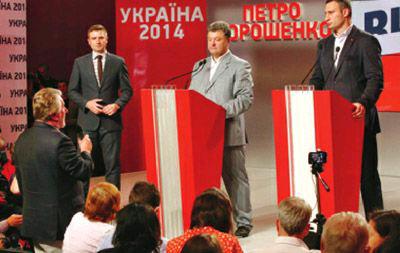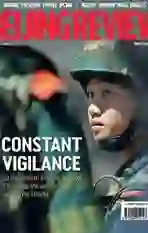A Semicolon,Not a Full Stop
2014-07-28ByYuLintao
By+Yu+Lintao
Ukrainian candy tycoon Petro Poroshenkos presidential election victory was unsurprising. What did come as a surprise, however, was that it happened in the first round of voting. The result has been welcomed by both the West and Russia. Although the East European country is currently in the midst of being torn apart, the West at least salvaged the basic fruit of the Ukrainian mess by securing a proWest president.
Russia, for its part, felt that compared with other pro-West Ukrainian politicians, the flexible and pragmatic Poroshenko couldnt be a better choice. Meanwhile, as Ukraine has reestablished its legitimate governing authority via an election, Moscow may find an opening to start direct talks with Kiev. In any case, it is an opportunity to usher in a turn for the deadlock.
However, in face of the serious row between Moscow and Kiev over Ukraines future direction and the issue of Crimea, talks will demand political wisdom from both sides.
Compared with his previous life as the socalled “candy tycoon,” Poroshenkos new career will be much more difficult, especially given the current situation in Ukraine.
Li Xing, a professor of international stud- ies at Beijing Normal University, claimed that Poroshenkos seemingly neutral stance toward the West and Russia helped Poroshenko win the election; still, the Ukraines new president faces a sea of difficulties both domestically and abroad.
A tough task
“The struggling economy, mounting conflicts in the eastern part of the country, and starting difficult talks with Russia are all tough tasks for Poroshenko,” said Ding Xiaoxing, a senior researcher on Russian and East European stud- ies with the China Institutes of Contemporary International Relations (CICIR).
Ding claimed Poroshenkos prime task should be easing tensions in the eastern states to prevent further national divisions.
The Ukrainian Government intensified military strikes on the anti-government paramilitary in Lugansk and Donetsk in eastern Ukraine following the election. Recent clashes in the rebellious Donetsk region have resulted in the deaths of more than 100 people, including civilians.
Ding said the increasing military strikes are not conducive to the settlement of the issue but may instead invite a serious response from Russia.
The economic situation of Ukraine is also worrying. In light of the current political crisis and deepening economic instability, international credit rating organization Moodys recently announced that Ukraine would face the largest GDP contraction in the Commonwealth of Independence States region, with a projected decline of around 5-10 percent in 2014. Not long ago, Moodys downgraded Ukraines government bond rating one notch from Caa2 to Caa3.
Ding said Poroshenkos first-round victory shows that most Ukrainian people hope the business tycoons practical style can bring the country stability and economic revival.
However, as the Ukrainian economy heavily relies on Russia and the oligopoly, observers doubted a breakthrough could be made quickly in the current situation.
In addition, Ding noted that as Poroshenko himself is a member of Ukraines oligarchic group, it is more difficult for him to change the current system.
As Ukraine declared to change its system of government from presidential to parliamentarian, the countrys head of government will be assumed by the majority leader—hence the power of the Ukrainian presidency will be weakened.
Currently, the party of former Premier yulia Tymoshenko holds a majority of seats in the Ukrainian parliament. Though Tymoshenko lost the presidential election, it is widely believed that she will further consolidate the position of her party in the country and continue to play a big role in Ukrainian politics, possibly affecting Poroshenkos foreign policy.
How much Poroshenko can achieve during his presidency is still a question to be decided in the future parliamentary election, said Li. The parliamentary election has been scheduled to take place by the end of the year.
In response to the Ukrainian presidential election, Russias Foreign Minister Sergei Lavrov said Moscow is ready to enter talks with the new leadership.
Aside from Russias official position on the election, Ding of the CICIR noted that the recent series of moves also showed that Moscow is inclined to ease the situation.
Russia did not recognize the pro-Russia separatists independence referendum in eastern Ukraine in early May. After the latest Ukrainian election, the majority of Russian troops were reported to have moved away from the border with Ukraine.
Testing the waters
Soon after winning the election, Poroshenko voiced hopes to meet the Russian leadership in the first half of June to discuss a solution to the crisis in his country, saying that Moscows assistance on the issue was crucial for Kiev.
It is widely said that as a successful businessman, Poroshenko is a pragmatist, and he knows clearly what Russia means for Ukraines national unity.
However, while Poroshenko extended an olive branch to Moscow for dialogue, the presidentelect took a tough stance toward Russia in his victory speech.
Poroshenko refused the Russian proposal of a federal system in eastern Ukraine and emphasized that he will never recognize the referendum in Crimea, which resulted in the peninsulas affiliation with Russia, saying he “would do his best to seek the return of Crimea.” He also reiterated Ukraines commitment to staying the course for integration with the EU.
yang Jin, an associate research fellow on international studies with the Chinese Academy of Social Sciences, said Poroshenkos tough remarks are understandable.
As the president-elect, Poroshenko must pose a tough stance to defend Ukraines national interests, said yang. But yang also noted that the new leaders remarks are full of flexible diplomatic parlance such as “using legal means,” which shows that he will keep a stance of both fighting and cooperating with Russia in the future.
Ding echoed yang, saying that Poroshenko needs to display his firm attitude on Ukraines national unity to his supporters.
But Ding also noted that Poroshenko actually has been taking a clear pro-West stance. According to Ding, as a supporter of former Ukrainian President viktor yanukovych, Poroshenko played an important role in the Orange Revolution a decade ago. He was also a major supporter of the anti-government protest that broke out in Ukraine at the end of 2013.
“Poroshenko will not back down from the course of Ukraines integration with the EU,”Ding told Beijing Review. But as for the Crimea issue, even though Poroshenko promised to do his best to seek the peninsulas return, “the die has been cast,” Ding said.
The problems facing the future negotiating table of Kiev and Moscow go beyond the Crimea issue. A key point in any negotiations with Moscow will be the price at which Ukraine purchases Russian natural gas. Moscow has demanded Ukraine pay back billions of dollars it saved on a significantly reduced gas price under yanukovych. The presidential election has done little to ease tensions in the east. Without the mediation of Moscow, it is unthinkable for Kiev to achieve reconciliation with the countrys eastern region.
Ding said it would be a tough process if talks between Kiev and Moscow really begin, and the talks will require political wisdom of both sides.
Moscow is watching the next moves of Kiev to see whether Poroshenko takes proper care of Russias interests or one-sidedly embraces the West, said Ding. If the new Ukrainian authorities cannot properly handle its eastern states or hurt Russias interests, it cannot rule out that Russia may escalate the situation, Ding added.
